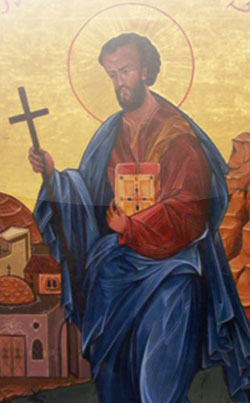
Feastday: August 5
Death: 180
A disciple of Christ sent by St. Thomas to the court of King Abgar the Black, the second century Osroene ruler. Legendary accounts claim Abgar wrote to Christ asking Jesus to cure him of an intolerable and incurable illness. Abgar's court was in Edessa in Asia Minor (modern Turkey). Addal cured Abgar and converted the king and his people to the faith. One of these was Addai, who became Addal's successor. Addal is also supposed to have sent another disciple, Man, to various sites along the Tigris River. It is known that Addal did missionary work around Edessa toward the end of the second century. Both Addal and Man have been venerated in the Syrian and Persian churches since that era. Addal is recorded as a martyr for the faith.
Christian saint and one of the seventy disciples of Jesus "Addai" redirects here. For other uses, see Addai (given name) and Addai (surname). "Mar Addai" redirects here. For the diocese, see Chaldean Catholic Eparchy of Mar Addai of Toronto.According to Eastern Christian tradition, Thaddeus of Edessa (Syriac: ܡܪܝ ܐܕܝ, Mar Addai or Mor Aday, sometimes Latinized Addeus) was one of the seventy disciples of Jesus. He is possibly identical with Thaddaeus, one of the Twelve Apostles.
Life
 Abgar receiving the Mandylion from Thaddeus (encaustic icon, Saint Catherine's Monastery, Mount Sinai).
Abgar receiving the Mandylion from Thaddeus (encaustic icon, Saint Catherine's Monastery, Mount Sinai).
Based on various Eastern Christian traditions, Thaddaeus was a Jew born in Edessa, at the time a Syrian city, (now in Turkey). He came to Jerusalem for a festival, and heard the preachings of John the Baptist (St. John the Forerunner). After being baptized by John the Baptist in the Jordan River, he remained in Palestine. He later met and became a follower of Jesus. He was chosen to be one of the seventy disciples, whom Jesus sent in pairs to preach in the cities and places.
After Pentecost and the ascension of Jesus, Thaddeus started preaching the gospel in Mesopotamia, Syria and Persia. Thaddaeus ordained priests in Edessa, converted many to Christianity and built up the church there. He also went to Beirut to preach, and founded a church there.
The Syriac liturgy referred to as the Liturgy of Addai and Mari, originated around the year 200 AD and is used by the Assyrian Church of the East and the Chaldean Catholic Church, and Chaldean Syrian Church and Syro-Malabar Catholic Church in India founded by Thomas the Apostle.
His feast is celebrated on August 5 in the Christian calendar.
Addai and the healing of King Abgar
| Part of a series on the |
| Eastern Orthodox Church |
|---|
| Overview |
|
Background
|
Organization
|
Autocephalous jurisdictionsAutocephalous Churches who are officially part of the communion:
Autocephaly recognized universally de facto, by some Autocephalous Churches de jure:
Autocephaly recognized by Constantinople and 3 other Autocephalous Churches:
|
Noncanonical jurisdictions
|
Ecumenical councils
|
History
|
Theology
|
Liturgy and worship
|
Liturgical calendar
|
Major figures
|
Other topics
|
|
| Part of a series on |
| Oriental Orthodoxy |
|---|
 |
| Oriental Orthodox churches |
|
Subdivisions
|
Noncanonical/Independent churches
|
History and theology
|
Liturgy and practices
|
Major figures
|
Related topics
|
|
|
|
Among the Eastern Orthodox faithful, Saint Addai was a disciple of Christ sent by St. Thomas the Apostle to Edessa in order to heal King Abgar V of Osroene, who had fallen ill. He stayed to evangelize, and so converted Abgar—or Agbar, or in one Latin version "Acbar" — and his people including Saint Aggai and Saint Mari.
Account of the Arab King Abgarus V of the kingdom of Osroene with capital city in Edessa and Jesus had corresponded was first recounted in the 4th century by the church historian Eusebius of Caesarea In the origin of the legend, Eusebius had been shown documents purporting to contain the official correspondence that passed between Abgar and Jesus, and he was well enough convinced by their authenticity to quote them extensively in his Ecclesiastical History. According to Eusebius:
Thomas, one of the twelve apostles, under divine impulse sent Thaddeus, who was also numbered among the seventy disciples of Christ, to Edessa, as a preacher and evangelist of the teaching of Christ. (Historia Ecclesiastica, I, xiii)
The story of the healing Thaddeus' evangelizing efforts resulted in the growing of Christian communities in southern Armenia, northern Mesopotamia and in Syria east of Antioch. Thaddeus' story is embodied in the Syriac document, Doctrine of Addai, which recounts the role of Addai and makes him one of the 72 Apostles sent out to spread the Christian faith. By the time the legend had returned to Syria, the purported site of the miraculous image, it had been embroidered into a tissue of miraculous happenings. The story was retold in elaborated form by Ephrem the Syrian.
Various traditions
St. Addai also appears in the First Apocalypse of James and the Second Apocalypse of James.
In Roman Catholic tradition, he and Saint Mari are considered patrons of Persian and Assyrian people.





